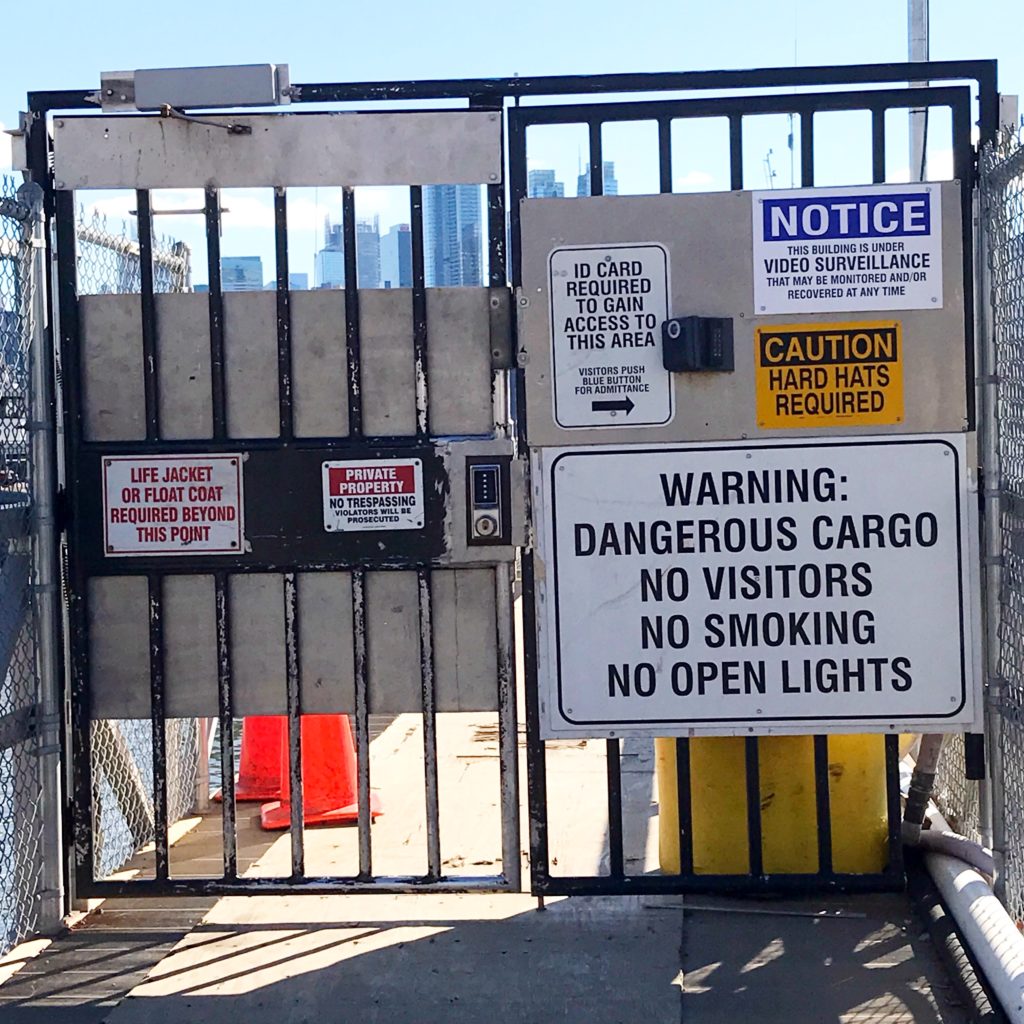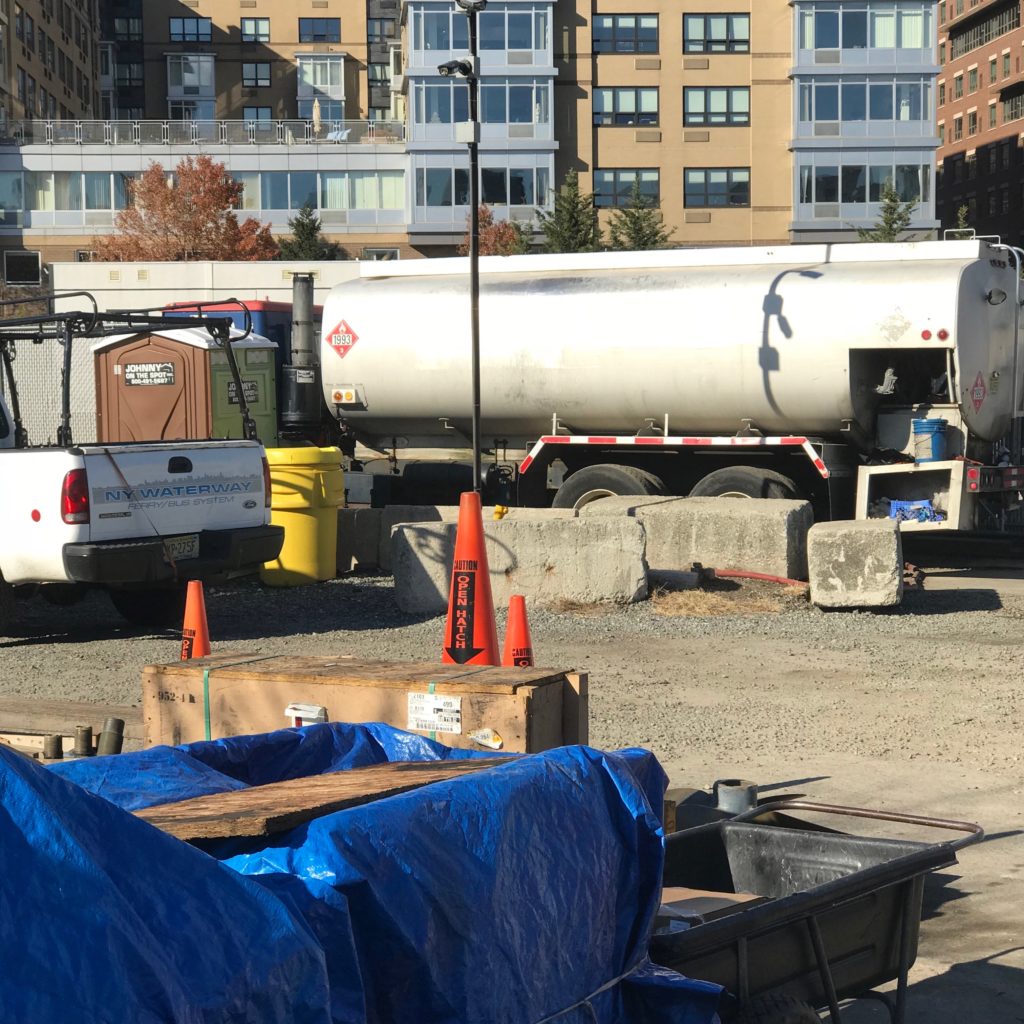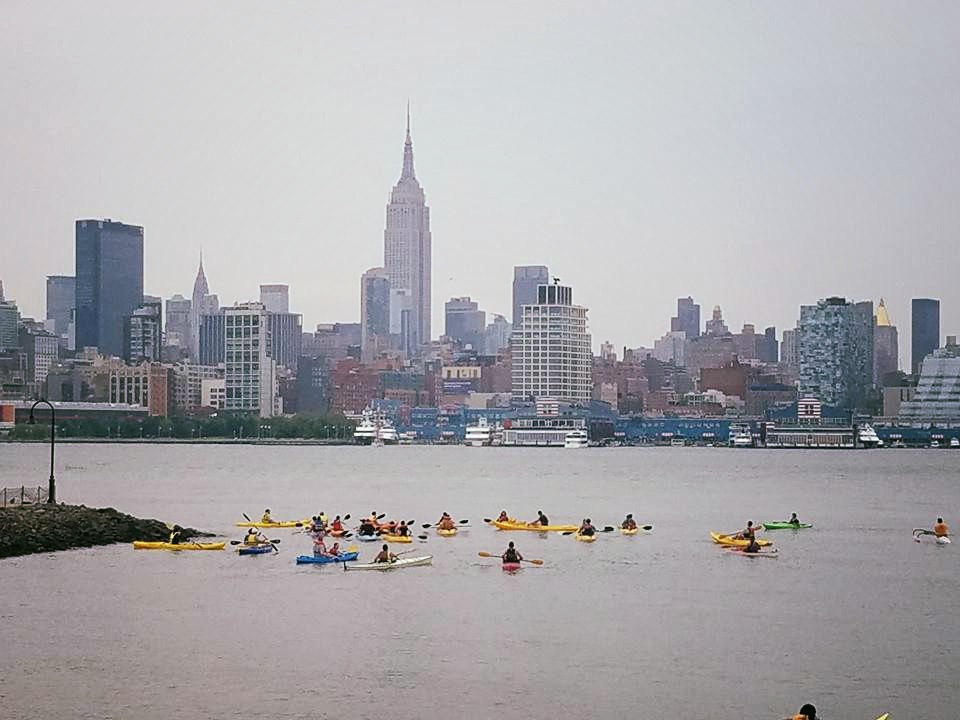Please attend; sign-up to speak re: ITEM 1801-06: Union Dry Dock – Property Acquisition
NJ Transit Board of Directors Meeting
Wednesday, January 10 at 9 a.m.
Board Room, One Penn Plaza East, Newark, New Jersey
By Ron Hine | FBW | December 7, 2017
On November 9, 2017, NY Waterway stunned Hoboken with the news that it had acquired the Union Dry Dock property at 901 Sinatra Drive and was moving its homeport to that location where it would refuel and repair its fleet of ferries and pump out sanitary wastewater. This news was coupled with the announcement that New Jersey Transit would enter into an agreement with NY Waterway for an option to purchase the site.
Five days later, NY Waterway submitted an application for a Waterfront Development Permit to the New Jersey Department of Environmental Protection (NJDEP). In order to expedite the permitting process, the ferry company requested a “provisional” permit. The application makes no mention of refueling or removal of sanitary wastewater.
In response, Hoboken residents submitted over 250 letters to the NJDEP vigorously opposing the application. The Fund for a Better Waterfront, the Maxwell Place Condo Association, the Quality of Life Coalition and Bike Hoboken were among the groups writing letters. Hoboken Mayor Dawn Zimmer and Mayor-Elect Ravi Bhalla jointly wrote a letter in opposition as did City Council President Jen Giattino and Second Ward Councilwoman Tiffanie Fisher.
In their letters, the Maxwell Place Condo Association and the attorney representing the City of Hoboken contended that there was no rationale provided for requesting a “provisional” permit and the application was, in fact, incomplete. On November 30, NY Waterway withdrew its application. The ferry company is expected to submit a new application shortly in an attempt to correct the defects of its November 14th application.
In the November 14 permit application, NY Waterway claims that its operation will essentially be the same as Union Dry Dock’s. The differences, however, are obvious:
- NY Waterway will operate 18 hours a day, 7 days per week; Union Dry Dock worked 8 hours a day, Monday through Friday.
- The City of Hoboken estimates there will be 80 ferry trips daily to and from the homeport; Union Dry Dock had just two slips and the repair of barges could take weeks to complete.
- The ferries shuttle back and forth from New York to New Jersey consuming huge quantities of diesel fuel, thus requiring frequent refueling; the Union Dry Dock barges, of course, have no engines and thus required no fuel.
- The City estimates that ferry crews will be making 240 vehicular trips through Hoboken to and from this waterfront site; delivery of fuel and supplies will add yet more traffic; Union Dry Dock had a small crew resulting in little impact on local traffic.
The ferry depot poses a significant threat of environmental damage and harm to the public’s health as follows:
Contaminating the air
The frequent ferry trips each day will result in the emission of substantial quantities of diesel exhaust. Most of the NY Waterway ferries operate with Tier 1 marine diesel engines, the most polluting class of diesel engines. Particulate matter is created during the incomplete combustion of diesel fuel. Its composition can contain hundreds of chemical elements, including sulfates, ammonium, nitrates, elemental carbon, condensed organic compounds, and even carcinogenic compounds and heavy metals. The fouled air will pose a health risk to all those in the area, especially nearby residents at Castle Point Terrace and Maxwell Lane, and students and faculty at the campus of Stevens Institute of Technology.
Fouling the Hudson River
NY Waterway’s fleet of 34 ferries will be refueled, repaired, cleaned and pumped empty of sanitary wastewater, leading to inevitable spills. Repairs require the use of hydraulic fluids, oils and lubricants. The milling and grinding of the metal ferry hulls discharges aluminum shavings.
Endangering critical wildlife
The air and water pollution will also create a serious threat to the diverse wildlife habitat at this site. This habitat will be further disturbed by the wakes and turbulence generated by the high speed ferries. The natural sand beach to the north of the former Union Dry Dock property is sited in an intertidal zone that plays a critical role in the area’s marine ecosystem. The horseshoe crab lays its eggs at this beach that are a vital food source for migrating shorebirds. The beach area is also home to the diamondback terrapin. The NJDEP has classified certain migratory fish as “species of concern” including striped bass, sturgeon, American shad and blueback herring all of which are found at this site. Atlantic ribbed mussels can be spotted lodged within the riprap.
Endangering human health and safety
The former Union Dry Dock site is located between two popular Hoboken parks: Maxwell Place Park and Castle Point Park. Just to the south is a skateboard park frequented by young adults and children as well as a public fishing pier. Just to the north is the Hoboken Community Boat House that sponsors free kayaking lessons from June to September serving over 6,000 paddlers per season. In August 2016, the New York Times reported that a NY Waterway ferry collided with a group of kayakers on the Hudson River near West 39th Street in Manhattan. Ten kayakers were rescued, five of whom were injured. One sustained a serious injury with his arm appearing to be partially severed.
Eliminating the opportunity for a continuous park along Hoboken’s waterfront
Since the 1990s, the City of Hoboken, with the assistance of many state and federal grants, has invested heavily in creating a public waterfront. Since the owners of Union Dry Dock have been seeking a buyer for a number of years, the Fund for a Better Waterfront has waged a campaign to secure the site as part of Hoboken’s continuous, public waterfront park. In June of this year, FBW collected over 2,100 signatures on a petition to the Mayor and Council to make the site a priority in the City’s open space planning. Locating the ferry depot at this property would destroy the opportunity to complete Hoboken’s waterfront park.
NY Waterway has completed a study of alternate sites to locate this ferry depot yet shared it with no one. Bayonne with its working waterfront would welcome such an operation. There are other sites that would be appropriate for refueling that would not have the same negative impacts.
Other letters to NJDEP
Bike Hoboken
Quality of Life Coalition
Maxwell Place Condo Assoc.
James Vance
Heather Gibbons with NYT article
Hartmut Grossman and Hudson River fishermen
Kate Valenta
Mayor Zimmer & Mayor-Elect Bhalla
Council President Giattino/ Councilwoman Fisher

Entrance to docks where NY Waterway ferries are refueled and repaired at Weehawken waterfront.

NY Waterway industrial-grade refueling operations in Weehawken, New Jersey.

Each year, the Hoboken Cove Community Boat House puts 6,000 paddlers into the Hudson River at the cove adjacent to the Union Dry Dock site.
Related Links
City to make offer to buy Union Dry Dock
City Council faced with standing room only crowd urging completion of waterfront park
15 environmental organizations urge Gov. to preserve Union Dry Dock as public space
3,000-year old outrigger canoe tradition lives on at the Hoboken Cove
NY Waterway’s improbable tale of eviction from Weehawken’s waterfront
Union Dry Dock is not an option for a ferry homeport but other sites are
FAQs on the ferry diesel depot proposed for Union Dry Dock site
NY Waterway lobbyists pressed Murphy administration to reverse course on Union Dry Dock
NY Waterway’s bogus talking points
The Life and Death of the Hoboken Cove
Hoboken mounts challenge to Army Corps/NJDEP permits
NJ Transit study identifies 5 sites more suitable than Union Dry Dock
FAQs: We answer your questions on NY Waterway depot in Hoboken
A brief history of NY Waterway and its founder, Arthur Imperatore
Tell NJ Transit Board to vote ‘no’ on MLK Day
Ferry homeport would reverse decades of progress at Hoboken waterfront
Public Park or Refueling Depot?
FBW letter opposing NJDEP permit application
NJ Transit’s dreadful plan for Hoboken waterfront
In 2012, NJ Transit abandons plans to acquire Union Dry Dock
FBW petition underscores Hoboken’s love of its waterfront
Union Dry Dock: Potential Parkland for Sale

